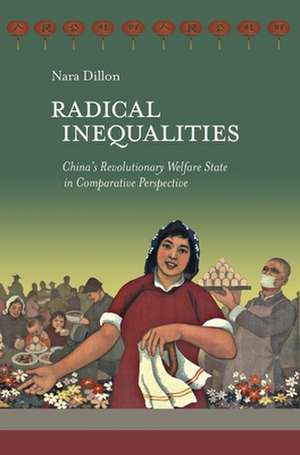Radical Inequalities – China`s Revolutionary Welfare State in Comparative Perspective: Harvard East Asian Monographs
Autor Nara Dillonen Limba Engleză Hardback – 23 noi 2015
Using newly available archival sources, Dillon focuses on the contradictory role played by labor in the development of the Chinese welfare state. At first, the mobilization of labor helped found a welfare state, but soon labor's privileges turned into obstacles to the expansion of welfare to cover more of the poor. Under the tight economic constraints of the time, small, temporary differences evolved into large, entrenched inequalities. Placing these developments in the context of the globalization of the welfare state, Dillon focuses on the mismatch between welfare policies originally designed for European economies and the very different conditions found in revolutionary China. Because most developing countries faced similar constraints, the Chinese case provides insight into the development of narrow, unequal welfare states across much of the developing world in the postwar period.
Din seria Harvard East Asian Monographs
-
 Preț: 262.55 lei
Preț: 262.55 lei -
 Preț: 303.54 lei
Preț: 303.54 lei - 19%
 Preț: 357.45 lei
Preț: 357.45 lei -
 Preț: 329.12 lei
Preț: 329.12 lei - 13%
 Preț: 387.46 lei
Preț: 387.46 lei - 13%
 Preț: 369.50 lei
Preț: 369.50 lei -
 Preț: 146.80 lei
Preț: 146.80 lei -
 Preț: 208.55 lei
Preț: 208.55 lei -
 Preț: 343.42 lei
Preț: 343.42 lei -
 Preț: 265.19 lei
Preț: 265.19 lei -
 Preț: 343.75 lei
Preț: 343.75 lei -
 Preț: 376.75 lei
Preț: 376.75 lei -
 Preț: 359.61 lei
Preț: 359.61 lei -
 Preț: 304.90 lei
Preț: 304.90 lei - 13%
 Preț: 368.38 lei
Preț: 368.38 lei - 13%
 Preț: 343.16 lei
Preț: 343.16 lei - 13%
 Preț: 345.28 lei
Preț: 345.28 lei -
 Preț: 236.02 lei
Preț: 236.02 lei - 13%
 Preț: 343.76 lei
Preț: 343.76 lei -
 Preț: 373.10 lei
Preț: 373.10 lei -
 Preț: 401.74 lei
Preț: 401.74 lei - 13%
 Preț: 410.80 lei
Preț: 410.80 lei -
 Preț: 373.36 lei
Preț: 373.36 lei - 13%
 Preț: 362.75 lei
Preț: 362.75 lei -
 Preț: 150.59 lei
Preț: 150.59 lei -
 Preț: 225.79 lei
Preț: 225.79 lei -
 Preț: 210.11 lei
Preț: 210.11 lei -
 Preț: 230.64 lei
Preț: 230.64 lei -
 Preț: 285.21 lei
Preț: 285.21 lei -
 Preț: 267.20 lei
Preț: 267.20 lei - 13%
 Preț: 342.71 lei
Preț: 342.71 lei -
 Preț: 373.98 lei
Preț: 373.98 lei -
 Preț: 200.84 lei
Preț: 200.84 lei -
 Preț: 328.44 lei
Preț: 328.44 lei -
 Preț: 186.22 lei
Preț: 186.22 lei -
 Preț: 379.32 lei
Preț: 379.32 lei -
 Preț: 239.78 lei
Preț: 239.78 lei -
 Preț: 367.33 lei
Preț: 367.33 lei - 19%
 Preț: 357.55 lei
Preț: 357.55 lei -
 Preț: 329.12 lei
Preț: 329.12 lei -
 Preț: 202.85 lei
Preț: 202.85 lei -
 Preț: 154.08 lei
Preț: 154.08 lei -
 Preț: 317.86 lei
Preț: 317.86 lei -
 Preț: 194.54 lei
Preț: 194.54 lei -
 Preț: 185.29 lei
Preț: 185.29 lei -
 Preț: 514.31 lei
Preț: 514.31 lei -
 Preț: 374.25 lei
Preț: 374.25 lei -
 Preț: 320.20 lei
Preț: 320.20 lei
Preț: 231.48 lei
Preț vechi: 310.44 lei
-25% Nou
Puncte Express: 347
Preț estimativ în valută:
44.30€ • 45.90$ • 36.97£
44.30€ • 45.90$ • 36.97£
Carte indisponibilă temporar
Doresc să fiu notificat când acest titlu va fi disponibil:
Se trimite...
Preluare comenzi: 021 569.72.76
Specificații
ISBN-13: 9780674504318
ISBN-10: 0674504313
Pagini: 344
Dimensiuni: 165 x 230 x 28 mm
Greutate: 0.59 kg
Editura: Harvard University Press
Seria Harvard East Asian Monographs
ISBN-10: 0674504313
Pagini: 344
Dimensiuni: 165 x 230 x 28 mm
Greutate: 0.59 kg
Editura: Harvard University Press
Seria Harvard East Asian Monographs
Descriere
The Chinese Communist welfare state was established with the goal of eradicating income inequality. Paradoxically, it widened that gap, undermining a primary objective of Mao Zedong's revolution. Nara Dillon traces the origins of the Chinese welfare state from the 1940s to the 1960s to uncover the reasons why the state failed to achieve this goal.
